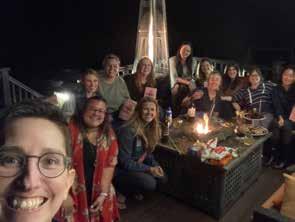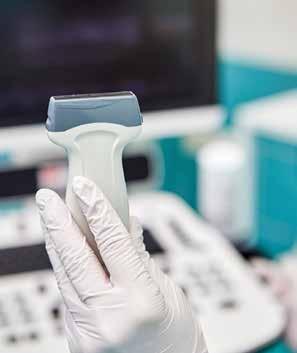SECTON REPORT YOUNG PHYSICIANS
Finding Escapism and Mentorship in a Book Club Alexandra Reed, DO; Cara Kanter, MD FAAEM – President, YPS; Jefferson Health Northeast, Emergency Medicine
Wellness has gained traction in the academic world not only as a concept, but as a necessity to physician mental health and well-being. Many emergency departments have found their stride in promoting wellness through activities, events and lectures over the past few years. Our residency program had an annual retreat in the form of a rafting trip to which both residents and attendings counted down the days. However, the ripple effects of the COVID-19 pandemic know no bounds, and one of the inevitable changes was a loss of traditional gatherings—a loss of wellness retreats and activities, and even the solidarity of weekly in-person conference. Struck with the question of what to do and how to adapt, it became clear that creating connection in this time was of paramount importance. While residency has always been challenging, wellness is arguably more important now than ever. The initial phases of quarantine resulted in a universal turn towards individualistic activities and newfound hobbies that could be completed at home (bread baking anyone?). Many turned towards reading not only as a hobby, but as a form of escapism during days when the outside world felt foreign and uninviting. Amongst the many reclaimed hobbies, reading specifically has
BOOK CLUB PROVIDED A REDIRECTION AWAY FROM STRESS, ISOLATION AND FEAR TOWARDS CONVERSATION, COMMUNITY, AND ENGAGEMENT.” been noted to be crucial as an activity for physician wellness as it forces the reader to slow down in contrast to the pace of working in the hospital.1 While there is a place for independence in wellness, enhancing social support systems is also a vital component to physician and resident well-being.2 We were struck with the realization that a healthy dose of escapism might actually be ideal in this time and could additionally be done in community— thus the idea for a Women’s Book Club for formed. Three contemporary books by female authors were presented and voted on by those interested, which was a large majority of female attendings and residents in the emergency medicine program at Jefferson Health Northeast in Philadelphia. Kim Liggett’s “The Grace Year” was chosen and all participants were given two months to read the book.3 In the weeks leading up to the book club meeting there was excited conversation in the ED at shift change between female residents and attendings working their way through the book. Rather than discussing COVID case trends or whether someone would embark on the adventure that HOWEVER, THE RIPPLE EFFECTS OF THE COVID-19 PANDEMIC KNOW is indoor dining, we were discussing the follies of a fictional teenNO BOUNDS, AND ONE OF THE INEVITABLE CHANGES WAS A LOSS OF TRAage girl, debating her decisions, and discussing what we might do DITIONAL GATHERINGS—A LOSS OF WELLNESS RETREATS AND ACTIVITIES, if put in her preposterous circumstances. When asked about their dream form of wellness, a committee of 29 residents stated their top priorities included camaraderie and mentorship.4 Mentorship can take many traditional and professional forms, but can also be fostered in the setting of a pandemic-induced book club. No one in the health care community has
AND EVEN THE SOLIDARITY OF WEEKLY IN-PERSON CONFERENCE.”
>> COMMON SENSE JANUARY/FEBRUARY 2021
39























